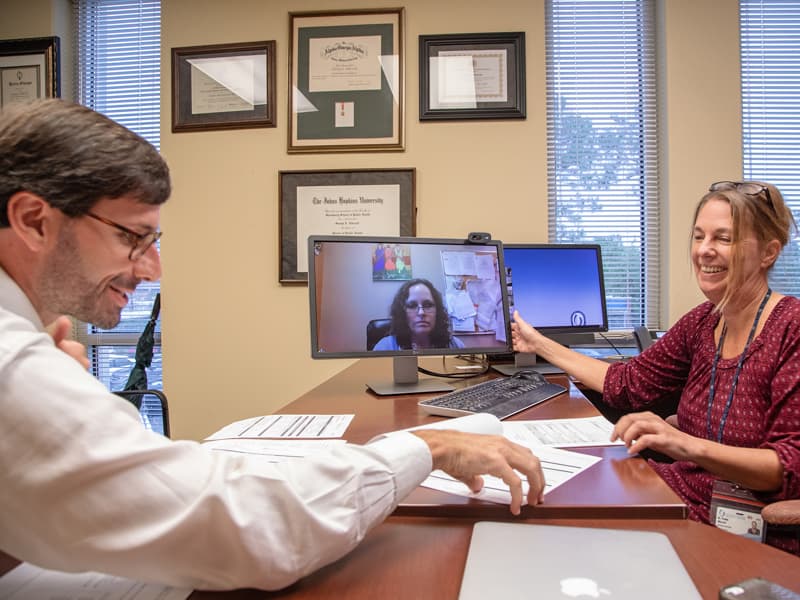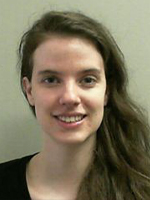Hepatitis C provider education ECHOes throughout Mississippi

Nurse practitioner Darryl Adams sees many uninsured patients who aren’t likely to get an appointment with a physician who specializes in infectious diseases.
But if they suffer from Hepatitis C, a viral infection that attacks the liver and can lead to serious liver damage, Adams wants to help them immediately, especially with medications that offer a cure.
“We need to have the ability to treat them where they are, so that they don’t have to go miles and miles down the road, and so they don’t have to wait for the referral process,” said Adams, who practices at Coastal Family Health in Bay St. Louis.
Adams is able to remove those roadblocks for Hepatitis C patients through Project ECHO, a national telehealth initiative that uses interactive video technology to connect community providers and specialists for real-time collaborative discussions.
The goal is to empower and educate primary care physicians, nurse practitioners, pharmacists, registered nurses and physicians’ assistants on how to recognize and treat Hepatitis C in their communities. In turn, those providers can help ensure that patients get high-quality treatment locally, from people they know and trust, without delays.
Adams is one of the Mississippi caregivers getting medical advice and Hepatitis C education from expert facilitators taking part in Project ECHO, which stands for Extension for Community Healthcare Outcomes. Project ECHO is offered via national hubs. UMMC’s Center for Telehealth coordinates Mississippi’s participation with Centro San Vicente, a federally qualified health center and Project ECHO hub in El Paso, Texas.
Dr. Svenja Albrecht, UMMC associate professor of infectious diseases medicine, is leading monthly hour-long sessions, with the next two set for Nov. 18 and Dec. 16. They’re free and offer continuing medical education credits, and participants can offer up for discussion their own patient cases, with identifying information excluded. Providers also are free to observe without entering the discussion, Albrecht said.

Ideally, about 20 providers take part in each session, said Morgan Davis, the Center for Telehealth’s Project ECHO program coordinator. “You can join the monthly sessions at any time,” she said.
Project ECHO began in 2003 as the creation of Dr. Sanjeev Arora, a University of New Mexico liver disease specialist. He was alarmed and frustrated because a growing number of rural Hepatitis C patients were coming to him after their disease had dramatically progressed. Patients were traveling hundreds of miles to see him, often at too late a stage in their disease for him to help them.
He wanted clinicians in rural and medically underserved areas to learn how to treat patients sooner at home. Today, training programs offered through Project ECHO are allowing thousands of providers to learn best practices and build expertise in treating Hepatitis C and other chronic diseases.
The Mississippi Department of Health doesn’t keep data on Hepatitis C cases reported in the state, but the Centers for Disease Control and Prevention considers the infection epidemic nationwide. The CDC estimates 2.4 million Americans are living with Hepatitis C, with infections rising because of the opioid crisis, increasing the urgency for diagnosis and treatment.
The ease of Project ECHO and the opportunity it gives providers to improve care is invaluable, said Patricia Gallegos, Centro San Vicente’s director of strategic initiatives. She is assisting Albrecht and the Center for Telehealth in taking part in the initiative.
“Providers log on and learn how to treat and recognize Hepatitis C in their own primary care setting,” she said. “Everyone learns from each other in collaboration with infectious diseases specialists.”
During the hub’s Oct. 21 Project ECHO videoconference, Albrecht began the session by welcoming participants, including Adams. “We have seven cases to present today,” she said. “I want to talk to you about treatment and diagnosis. I know a lot of you treat, but it’s still important to go through some of the information.”
Albrecht led the group through identifying who needs to be screened for Hepatitis C, which also is a leading cause of liver cancer. Among them: baby boomers, people who are incarcerated, people with chronic liver disease, those with HIV infection, those who have used illicit drugs in the past or who currently use them, and men who have sex with men.
“Most of the time, we don’t get a patient’s history in great detail,” she told them. “It’s very rare that we sit down and talk to our patients about every one of these factors.”
Adams presented two cases, seeking the thoughts of the group on how she should treat each patient. “His labs are really unusual,” she told them as the patient’s records, presented anonymously, flashed on the screen. “His liver enzymes are really, really high. We need to get him taken care of.”
All the while, Albrecht guided the conversation as providers joined in the discussion, free to ask questions or offer advice. Albrecht weighed in after that, giving her expert advice on a treatment plan for each patient presented during the call and later providing a written summary of recommendations.
“We want the interaction between the providers,” she said. “A provider might have a proposed plan, but just needs help.”
If you don’t know someone has Hepatitis C, you can’t cure them of what can be a deadly disease, Adams and Albrecht say.
For most patients, the treatment consists of a once-daily medication in pill form for either eight or 12 weeks. “Hepatitis C is completely curable,” Albrecht said. “Well over 95 percent of patients respond, and if not, there are still other medications that can work.”
Hepatitis C anti-viral drugs, however, are costly. Just one daily sofosbuvir pill costs $1,000, and a full 12-week course of treatment with the same drug costs $84,000. Insurance coverage varies, depending on the carrier.
At her federally qualified health center, Adams said, “we are doing a big push to see that baby boomers are screened, and folks who have used IV drugs or had a needle stick in a health care setting in the past.
“Targeted screening is important, but it’s easy to miss in people who don’t disclose their risk factors, and sometimes a challenge if a patient is coming in for something else entirely,” she said. “We can’t cure the hepatitis if we can’t find it. If we miss a screening opportunity, that’s one more person who is not cured.”
Through Project ECHO, Adams said, she’s learned that a patient visit might need a little adjusting to ensure a hepatitis screen when necessary. “There’s so much going on in that little bit of time we have for an office visit,” she said. “I try to make sure I address it on a visit where it makes sense, like an annual wellness check.”
Adams is encouraged by the growing number of referrals she’s receiving for patients diagnosed with Hepatitis C or who need screening. “The more we screen, the more we will find. That means more people will be cured.
“Having the ECHO available for one of my cases that isn’t quite as straightforward, just to get that expert advice, is invaluable,” Adams said. “I’m not a specialist; none of us in primary care are specialists. Knowing when we get to that line that we don’t have to cross, and having Dr. Albrecht available, is wonderful.”
Peyton Herrington, a UMMC clinical pharmacist, and Davis are on Albrecht’s Project ECHO team. Albrecht hopes to include other UMMC caregivers, such as a hepatologist for more advanced liver disease cases and a psychiatrist, in future sessions. “A lot of the time with Hepatitis C patients, mental health is discussed,” she said.
Project ECHO is especially valuable to Mississippi’s rural caregivers, Albrecht said. “The idea is to grow it, and that depends on providers and their caseloads,” she said.
Thanks to Project ECHO, Adams said, her patients are getting specialist-level care “because we can put (Albrecht’s) expertise into my cases.
“I don’t know how some of my patients would do that otherwise,” she said. “I’m just so grateful to her, and for her careful attention to our cases.”
Mississippi providers wishing to join Project ECHO can contact Davis at Mdavis11@umc.edu or 601-815-4226.


